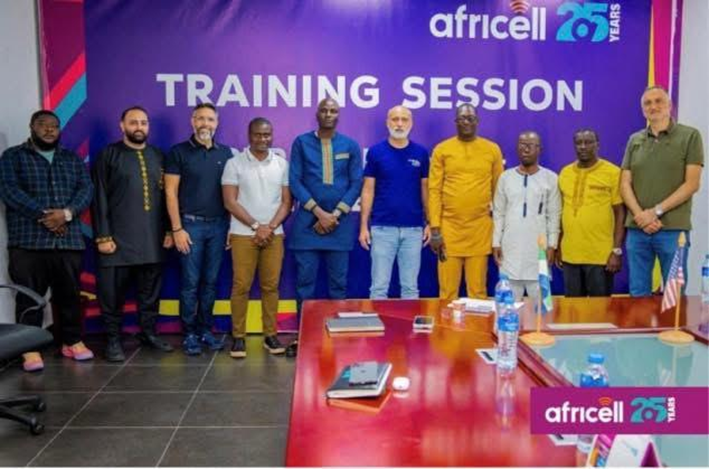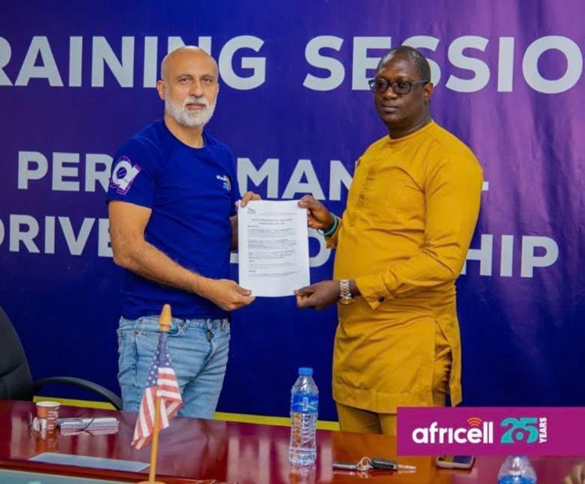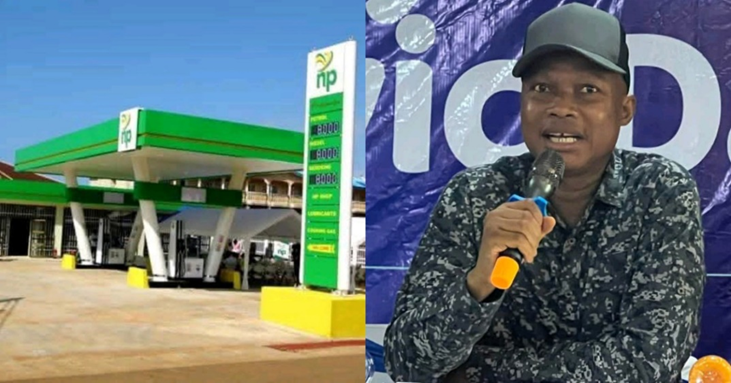By Mackie M. Jalloh
In a renewed effort to foster a stronger relationship between the private sector and the media, Africell Sierra Leone has engaged with the Guild of Newspaper Editors – Sierra Leone (GoNE-SL) to explore ways of deepening collaboration, promoting responsible journalism, and advancing digital innovation in the country’s media landscape. The engagement, which took place on Friday, October 3rd, 2025, at Africell’s corporate headquarters on Wilberforce, marked a significant milestone in the ongoing dialogue between corporate institutions and the press on national development issues.
The meeting brought together senior editors from various newspapers, led by GoNE-SL Chairman Thomas Dixon, who described the engagement as a forward-thinking step in rebuilding trust and strengthening operational partnerships between the media and the telecommunications sector. He emphasized that the Guild’s new leadership is determined to create a sustainable framework for collaboration that benefits both the media and corporate entities that rely on journalism for public communication and accountability.
In his remarks, Mr. Dixon commended Africell for its consistency in supporting national development initiatives and for maintaining one of the most recognizable brands in the country. He noted that Africell’s role in enhancing connectivity across Sierra Leone has directly supported the work of journalists, particularly those in remote areas who depend on reliable mobile networks and data access to file stories.
The GoNE-SL Chairman also used the occasion to outline the Guild’s new strategic direction, which focuses on institutional capacity-building, financial sustainability, and technological adaptation within the print media sector. He revealed that plans are underway to establish a centralized printing press managed under a cost-recovery model — a move expected to reduce production costs for newspaper publishers, encourage collaboration, and maintain quality across the board.
“We envision a media ecosystem that is self-sufficient, technologically empowered, and ethically grounded,” Dixon said. “Africell’s involvement in this journey will not only support the media industry but also reinforce the company’s image as a corporate partner that believes in free and responsible journalism.”

Speaking on behalf of Africell, Abdul Karim Sesay, the company’s Media Manager, warmly welcomed the visiting delegation and applauded the Guild for initiating a meaningful dialogue with the private sector. He acknowledged the vital role of editors in setting national narratives and shaping informed public discourse, adding that Africell’s values align closely with media development, information access, and innovation.
Mr. Sesay highlighted Africell’s longstanding collaboration with various media bodies, including the Sierra Leone Association of Journalists (SLAJ) and more than 70 radio stations nationwide. He reaffirmed the company’s readiness to continue supporting initiatives that promote media professionalism, youth engagement, and digital literacy.
“Africell believes in a vibrant, independent, and digitally progressive media,” Sesay said. “We see technology not as a competitor to traditional media, but as a tool that can empower journalists to reach wider audiences, share information faster, and hold institutions accountable with credibility and accuracy.”
The discussion also touched on emerging opportunities for collaboration in the digital space, particularly around data-driven journalism, media digitization, and training initiatives that can enhance the capacity of editors and reporters to adapt to new technologies. Africell’s emphasis on digital transformation resonated strongly with the Guild’s vision to integrate technology into newsroom operations and content delivery.
Public Relations Officer Komba Fillie, who introduced the visiting team, expressed appreciation for Africell’s hospitality and openness to collaboration. He noted that building strong relationships between journalists and corporate institutions is essential for mutual understanding, transparency, and national progress.
The visit concluded with a shared commitment to deepening the partnership through future programs, including capacity-building workshops, mentorship sessions, and joint advocacy on issues affecting the media and telecommunications sectors. Both parties agreed that the success of Sierra Leone’s democracy and development agenda relies heavily on open communication, innovation, and a free but responsible press.
As Sierra Leone continues to navigate the digital age, the Africell–GoNE-SL partnership stands as a promising example of how the corporate world and the media can work together to drive positive change, empower communities, and uphold the principles of truth and accountability that underpin a democratic society.



